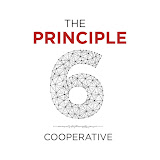Meredith Lobel, Co-Founder & Chief Product Officer, Principle 6 (USA)
Moderator of the plenary session: “Co-Creating for Inclusive and Lasting Change”
Meredith Lobel is a leading voice at the intersection of cooperative values and digital innovation. As Co-Founder and Chief Product Officer of Principle 6, she works to equip cooperatives with the tools they need to thrive in a fast-changing world — without compromising their democratic foundations.
At GICS 2025, Meredith will moderate the plenary session “Co-Creating for Inclusive and Lasting Change,” a conversation that aims to spotlight how co-ops can lead the way in building more inclusive, sustainable, and resilient systems. In this short Q&A, she reflects on her path, her work, and what she hopes to inspire through this pivotal session.
- Can you tell us a bit about your personal and professional journey, and what led you to co-found Principle 6?
My path has centered on building movements that bolster vision with infrastructure. From my earliest days working with fair-trade coffee co-ops in Central America, I witnessed firsthand how cooperative models could rewrite the rules of commerce to center people and planet. That belief guided me into Ashoka, where I partnered with changemakers globally, and discovered the power of supporting social entrepreneurship through infrastructure and systems, not just narratives. From building a wellness start-up spun-out from IDEO to guiding mission-driven innovation teams, I complement systems-level thinking with human-centered design, helping organizations create structures that nurture innovation, inclusion, and impact.
Alongside Rochdale Award Winner Howard Brodsky, whose founding vision is the bedrock of Principle 6, and co-founders Megan Michelakos and Justin Hammons—both carrying decades of expertise delivering marketing and technology services for cooperatives—we set out to create the digital infrastructure to accelerate the cooperative movement. We believed that cooperatives should have purpose-built tools to empower them to build, learn, and act together.
That belief is our compass: cooperation among cooperatives as both a principle and a practice, supported by platforms that make democratic governance and collaborative action more practical and more powerful.
- What is the mission of Principle 6, and how does your work support cooperative transformation?
Named after the 6th Cooperative Principle, ‘Cooperation among Cooperatives,’ The Principle 6 Cooperative is a member-owned cooperative designed to equip cooperatives with the shared digital infrastructure they need to adapt and thrive in a fast-changing world—without compromising their values.
Our mission is to strengthen the connective tissue of the cooperative economy so that co-ops can collaborate, govern, and grow with integrity. We believe that the future of the cooperative economy depends on accessible, interoperable, and values-driven tools that work across sectors and geographies.
In practice, this means building platforms that make it easier for co-ops to share intelligence, communicate impact, and collaborate at scale. From member engagement systems to cross-cooperative marketplaces, our products are designed not only to solve immediate operational challenges, but also to strengthen the long-term resilience of the cooperative movement. By designing with and for co-ops, we’re helping cooperatives not only keep pace with change but also lead it.
The equitable ownership movement deserves digital infrastructure as bold as its values. Principle 6 is that infrastructure.

- As the moderator of the plenary “Co-Creating for Inclusive and Lasting Change”, what themes or conversations do you hope to bring forward?
I am excited to have the privilege of moderating Co-Creating for Inclusive and Lasting Change, which I hope will be a dynamic conversation on how cooperatives can power the shift to a fairer, greener future—through meaningful work, sustainable investments, and shared values that strengthen communities.
I intend to surface the practical ways in which cooperation can be a force multiplier for systemic change. That means talking frankly about the tensions and trade-offs that come with scaling inclusive systems, and sharing models where co-creation has led to enduring, not just symbolic, shifts. I want us to examine how co-ops can work across sectors — from agriculture to tech to energy — to address intersecting crises like climate change, inequality, and democratic erosion. I want this dialogue to be a space where bold ideas meet practical pathways: where we talk about environmentally responsible investments and people-centered governance not as ideals, but as the building blocks of a more equitable future.
Another key theme will be exploring what is needed to make these bold advancements happen at a pace commensurate with the challenge. Cooperatives have the potential to be anchor institutions for transformation — if we invest in the systems, skills, and relationships that make cooperation across different industries, geographies, and sectors possible. We want to explore what investments and infrastructure are needed to propel the cooperative sector to take a lead addressing these challenges.
- From your perspective, what are some of the most powerful ways cooperatives can help accelerate the ecological and social transition?
Cooperatives are designed for the long view—where ownership and accountability can align in service of people and planet. This makes them natural leaders in the ecological transition. Across the world, member-owned utilities are building community solar and wind farms that keep both profits and decision-making local. Agricultural cooperatives are helping small-scale farmers transition to regenerative and organic practices, restoring soils while securing fair market access. Housing co-ops are locking in long-term affordability through community land trusts, while retrofitting buildings for energy efficiency that individual owners could never afford alone. The result is environmental stewardship woven directly into governance, creating resilience that grows from the bottom up.
Socially, co-ops prove that business can be democratic, equitable, and competitive all at once. Worker-owned enterprises are turning textile waste into valuable new products, cutting landfill use while creating dignified jobs. Credit unions and cooperative banks are directing capital into local green infrastructure instead of speculative markets, ensuring that investments serve community needs. Across these diverse sectors, co-ops model what it means to share power, distribute wealth, and link success to the well-being of both people and the places they call home.
- What would you most like participants to take away from this session?
I hope participants leave this plenary with both a spark and a map—energized by stories of cooperatives leading profound change, and equipped with clear, actionable strategies to advance it. I want them to see that these models are not niche or experimental, but scalable, resilient, and ready for the urgent work ahead.
Most of all, I hope they feel themselves part of a shared movement—one in which individual success is bound up with the health of the whole. It is important to me that participants feel seen and heard—to recognize that while this work is complex, it’s more achievable with solidarity.
If we leave GICS 2025 with stronger connections, deeper trust, and a renewed commitment to building inclusive, lasting change, then we will have already taken a vital step forward.





